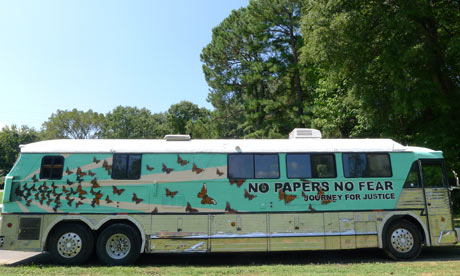Undocumented Latinos end protest tour of south at Democratic convention
September 03, 2012
'No Papers No Fear' group reach Charlotte, North Carolina after six weeks of holding rallies and confronting prejudice.

For the past 15 years Miguel Guerra has been living in the shadows as an undocumented Latino immigrant in the US. He kept out of view, avoided public places and never spoke his mind to anyone outside his immediate family.
Not any more.
Under a blazing North Carolina sun, Guerra joined almost 50 other undocumented Latino immigrants on a Sunday in a park on the outskirts of Charlotte, the North Carolinan venue of this week's Democratic national convention. It was in effect a mass coming out ceremony.
For the past six weeks the group has been riding across the American south in a converted Greyhound bus bearing the slogan: "No Papers No Fear". They have stopped in about 20 cities in Arizona, Colorado, New Mexico, Texas, Louisiana, Mississippi, Tennessee, Alabama and Georgia before arriving in North Carolina, holding rallies and confronting anti-Latino prejudice along the way.
"We're no longer afraid to say we are undocumented," Guerra declared.
For a busload of unauthorised immigrants to ride openly through some of these areas is no joke, even in 2012. Several of the states – notably Arizona where the journey began, Mississippi, Tennessee and Georgia – have been at the forefront of the push across the southern states to tighten immigration laws with the express intention of driving out thousands of illegal Latinos back to Mexico.
Guerra knows firsthand how perilous the journey was. Early on in the ride he and three other members of the No Papers No Fear group held a civil disobedience protest outside the courthouse in Phoenix, Arizona where Sheriff Arpaio, the controversial architect of harsh policing methods against undocumented Latinos, was at that time on trial for alleged civil rights abuses.
Guerra, 36, was arrested, paradoxically handed over to Arpaio's own police department, which in turn passed him to the immigration authorities. He was detained for three days and is still immersed in deportation proceedings. Had he known that he would be arrested and potentially deported, he insists he still would have gone ahead with the bus ride. "They want to criminalise me, but we are showing that I'm not the criminal, Arpaio is."
Would he still think the protest was worth it should he be deported back to Baja California, the region of Mexico from which he came aged 21 to try his luck in the US? "Yes. At least I know I played a part in history here, and can leave with my head held high."
Organisers of the bus ride, from a coalition of the National Day Laborer Organisation, Puente and other groups, designed the journey to begin in Arizona, the state that led the anti-illegal immigrant offensive with its notorious law SB 1070. They decided to end the trip at the Democratic national convention in Charlotte, rather than in Tampa where the Republicans convened last week, because they hoped to have more impact attempting to influence the Democratic debate.
There have been sparks during the six weeks of the ride. After the arrests in Phoenix, there was further confrontation with police in Knoxsville, Tennessee, where riders carried out a protest outside the office of Sheriff JJ Jones, who has plans to implement a deportation program known as 287(g).
Four were arrested, including two undocumented people, though they were later released.
The bus also stopped in Sylva in the west of the state of North Carolina. The organisers of the ride had heard that the sheriff there, Jimmy Ashe, had been erecting check points outside Latino neighbourhoods in the area where the police, backed up by immigration officials, were conducting random searches of papers.
When the bus riders asked local Latinos to join them in rallying outside the sheriff's office, they were told that the inhabitants of Sylva were too scared of retribution to speak out in public. But by the end of the protest, many local residents had come and joined the rally.
"That was a microcosm of this whole bus tour is about," said one of the organisers, Marisa Franco. "It's about taking the risk and showing that speaking out is more effective than hiding in the shadows."
Natally Cruz, one of the riders, said that when she first joined the bus she was frightened about what would happen to her. Now 25, she came to Arizona from Mexico when she was eight years old and has lived there without authorisation ever since.
She will be applying for deferred action under President Obama's new executive order that will allow young Latinos aged 15 to 30 who are studying in college to postpone any threat of deportation for two years and gain work permits. She is grateful to Obama for that, but calls on the president to extend the reform to include older members of her family, six of whom who have faced deportation and one of whom is currently in detention.
She recalls the moment she joined the first sit-down protest at the start of the bus ride. "I was scared of what they would do to me. But once I sat down and started to shout out I felt a great surge of energy – it was like a heavy stone I'd been carrying on my back had been lifted off me."